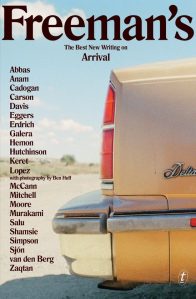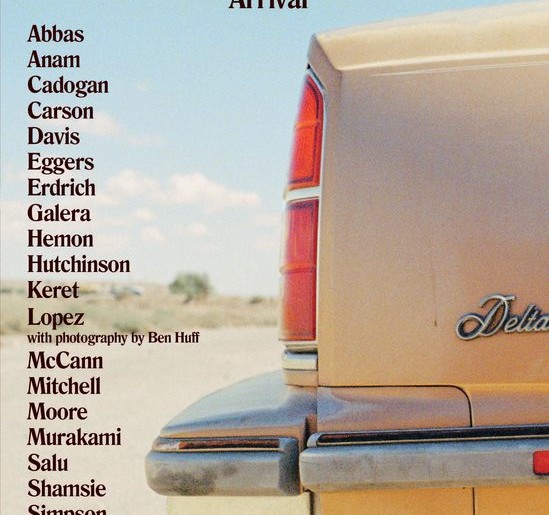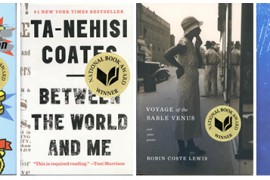 Despite the doomsayers, I am a giddy optimist about the future of good writing: books, short stories, poetry, and essays. Most times, it is enough to just feel things are going to be ok. But there are also those welcome tangible incidents of reassurance. John Freeman is the highly respected former president of the National Book Critics Circle, editor of Granta until 2013 and regular contributor of stories and reviews to major publications. He has an insider’s knowledge of the business of writing. Thus the launch of the first volume of the eponymous biannual publication Freeman’s: an anthology of the The Best New Writing is particularly welcome.
Despite the doomsayers, I am a giddy optimist about the future of good writing: books, short stories, poetry, and essays. Most times, it is enough to just feel things are going to be ok. But there are also those welcome tangible incidents of reassurance. John Freeman is the highly respected former president of the National Book Critics Circle, editor of Granta until 2013 and regular contributor of stories and reviews to major publications. He has an insider’s knowledge of the business of writing. Thus the launch of the first volume of the eponymous biannual publication Freeman’s: an anthology of the The Best New Writing is particularly welcome.
Freeman describes the first edition the best new writing on Arrival as an “experiment in re-creating the elemental feel of that journey.” Some involve what might be considered a conventional journey, like Colum McCann’s story centered on Dublin Airport. But in what is a highly accessible and sometimes enormously moving collection, it can be as diverse as arriving at menopause or finally finding contentment. How each story encapsulates the theme is sometimes as intriguing as the work itself.
Freeman has assembled an eclectic collection of fiction, non-fiction and poetry by some of the most exciting and innovative writers around including Louise Erdrich, Dave Eggers, Etgar Keret, Haruki Murakami and Laura van den Berg.
poetry by some of the most exciting and innovative writers around including Louise Erdrich, Dave Eggers, Etgar Keret, Haruki Murakami and Laura van den Berg.
Garnett Cadogan’s powerful piece reflects on how the colour of his skin affects what is to him the most elemental part of his life, walking the streets first of his native Jamaica then of New Orleans and New York City. It is particularly timely in view of the current discussion sparked by Between the World and Me by Ta-Nehisi Coates.
In Search of Space Lost by Aleksandar Hemon, the Sarajevo-born author reveals how his parents, instead of being “swallowed and digested by the host culture” in Canada where they had escaped to at the height of the war in Bosnia, methodically carved out a new world for themselves, their own personal space reflecting both “lives”.
Haruki Murakami‘s Drive My Car is about a usually taciturn middle-aged actor reflecting on the death of his wife with the young woman who drives him to and from the theatre where he is performing. Etgar Keret’s Mellow is a hilarious account of his first official paid appearance at a public reading of his book made memorable (if only he could remember it) after a few illicit puffs of weed during the journey.
 On Learning Norwegian by the wonderful Lydia Davis is, ironically in light of her penchant for bravura brevity, the longest inclusion. In it, she writes in painstaking detail of the process of reading Dag Solstad’s weighty Telemark Novel in the original without a dictionary. Etymological sleuthing and a healthy slice of guesswork are her chosen tools of trade. Less than half way through I was ready to look up the Norwegian for boredom and tempted to emulate Davis’s admitted practice of giving up on long books. By the end I was confounded and entranced.
On Learning Norwegian by the wonderful Lydia Davis is, ironically in light of her penchant for bravura brevity, the longest inclusion. In it, she writes in painstaking detail of the process of reading Dag Solstad’s weighty Telemark Novel in the original without a dictionary. Etymological sleuthing and a healthy slice of guesswork are her chosen tools of trade. Less than half way through I was ready to look up the Norwegian for boredom and tempted to emulate Davis’s admitted practice of giving up on long books. By the end I was confounded and entranced.
Freeman’s collection, which is put out by Text Publishing, traverses the globe as well as the depth of our humanness: our doubts and fears, our regrets and our overwhelming resilience. What a welcome addition to the world of words.




Comments are closed.